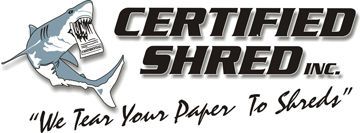What Can I Shred With a Shredding Service?

In today’s digital age, the security of your personal and business information has never been more crucial. Yet, many of us overlook a key aspect of data protection: the safe disposal of physical documents and digital media.
Shredding services, often underrated, play a vital role in safeguarding sensitive data by destroying outdated or unnecessary documents securely. Whether you're a business owner in Salt Lake City or a resident dealing with piles of personal paperwork, understanding what you can safely shred is essential.
This guide will walk you through various items that shredding services can handle, ensuring that your private information remains just that—private. Let’s dive into the types of materials you should consider for shredding.
Paper Documents
Every day, countless paper documents are discarded, many containing sensitive information that could pose a risk if intercepted. Here's what you should shred:
- Financial Documents: Bank statements, old tax returns, and any financial records not needed for long-term storage should be shredded to prevent identity theft.
- Legal Documents: From outdated contracts to personal identification copies, legal documents often contain confidential details that must be destroyed securely.
- Business Papers: Client lists, internal reports, and strategy documents are gold mines for competitors. Shred them to protect your business intelligence.
- Junk Mail: Surprisingly, pre-approved credit offers and other junk mail could be used in identity fraud. Shred them instead of tossing them in the bin.
Regular shredding of these documents keeps your personal and professional data safe and minimizes the risk of costly security breaches.
CDs and DVDs
Physical media like CDs and DVDs can also contain sensitive information. They need secure disposal to prevent data leaks.
- Digital Backups: Old backup disks might hold personal or corporate data you don't want falling into the wrong hands. Shred them to ensure their destruction.
- Software Installations: Some CDs and DVDs include license keys or proprietary software. Destroy them securely to protect against piracy or data theft.
- Multimedia Files: Family videos or confidential work presentations stored on discs shouldn't be left exposed. Shredding ensures they are unrecoverable.
In Salt Lake City, many businesses and individuals rely on shredding services to keep their digital data safe. Securely disposing of old CDs and DVDs is crucial to avoiding unauthorized access to sensitive information. Protect your data and privacy by shredding your old media.
Credit Cards and ID Cards
Credit and ID cards carry personal information that can lead to identity theft if mishandled.
- Expired Credit Cards: Old, expired cards still contain data that fraudsters can exploit. Shredding makes the information inaccessible.
- Obsolete Membership or ID Cards: Gym memberships, work IDs, or any other cards with your details should be shredded when no longer needed.
- Damaged Debit Cards: Don't toss them out carelessly. Destroy them to prevent unauthorized access to your financial accounts.
In Salt Lake City, shredding services ensure your cards are fully destroyed. With financial fraud on the rise, this small step provides immense peace of mind for residents and businesses alike.
Other Items
Shredding services aren't limited to just paper documents or cards. They can also securely handle:
- Hard Drives: Old computer hard drives often contain sensitive files and passwords. Shredding prevents data recovery, protecting personal and business information.
- Floppy Disks: Even though floppy disks are outdated, they can still hold valuable data. Ensure proper destruction with a shredding service.
- USB Sticks: USB drives, which store private data or project files, can be destroyed quickly to prevent data breaches.
Shredding these items keeps data safe from recovery, making it impossible for sensitive information to fall into the wrong hands.
Industry Compliance and Best Practices
- Industry Standards:
- HIPAA: For healthcare providers, HIPAA mandates the secure disposal of patient records. Shredding ensures compliance.
- FACTA: Financial institutions must follow FACTA rules for proper disposal. Shredding protects against unauthorized access to financial records.
- GDPR: For companies operating globally, GDPR requires secure data destruction to protect customer information.
- Best Practices:
- Document Storage: Keep files you must retain in a secure location. Label them with destruction dates to ensure timely shredding.
- Shredding Intervals: Conduct regular shredding sessions, ideally quarterly, to prevent data accumulation and minimize risks.
Following these standards and best practices is essential to protect your data and remain compliant.
Conclusion
Protecting your sensitive information is crucial in today's data-driven world. From paper documents and CDs to credit cards and hard drives, shredding services offer a secure solution to destroy confidential materials and prevent unauthorized access. Compliance with regulations like HIPAA, FACTA, and GDPR requires diligent disposal, and proper shredding intervals help maintain data security.
Ready to secure your data? Contact Certified Shred for reliable, secure shredding services across Salt Lake City, Ogden, Logan, Lehi, and Provo. Safeguard your information today!
Frequently Asked Questions
-
Q: How often should I shred my documents?
The frequency depends on your data retention policy and the volume of sensitive information. A quarterly shredding schedule is a good starting point for most households and businesses.
-
Q: Are shredded materials recyclable?
Yes, paper from shredded documents is often recycled. Some services recycle plastic remnants from CDs, DVDs, and credit cards as well.
-
Q: Can I watch the shredding process for peace of mind?
Yes, many shredding companies offer on-site shredding or allow customers to view the process via live video for transparency and reassurance.
-
Q: What should I do if I accidentally shred important documents?
Contact a data recovery expert. While it’s challenging to recover shredded documents, digital backups could be restored if available.
-
Q: Do shredding services handle digital media like USB drives?
Yes, reputable shredding services securely destroy USB drives and other digital media, ensuring sensitive information isn't recoverable.
Contact Information
Phone: 801-972-4748
Email: sales@certifiedshred.com
Address: 537 Pickett Cirlce Suite 600 Salt Lake City UT 84115
Business Hours:
- Mon - Thu
- -
- Friday
- -
- Sat - Sun
- Closed
Service Areas












